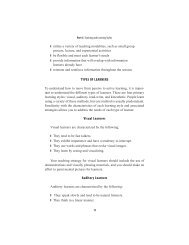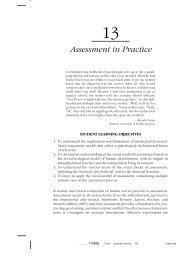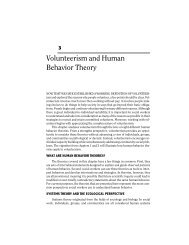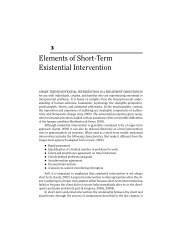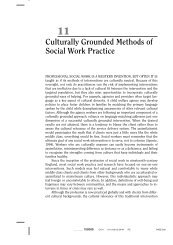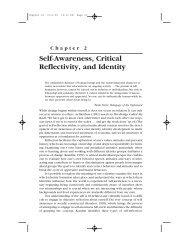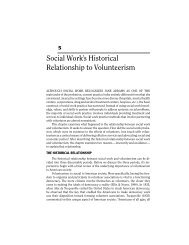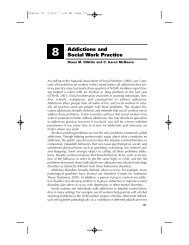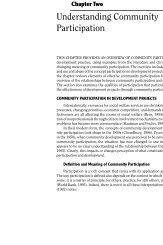An Experiential Approach to Group Work - Lyceum Books
An Experiential Approach to Group Work - Lyceum Books
An Experiential Approach to Group Work - Lyceum Books
Create successful ePaper yourself
Turn your PDF publications into a flip-book with our unique Google optimized e-Paper software.
FM 11/17/08 8:33 AM Page i<br />
<strong>An</strong> <strong>Experiential</strong><br />
<strong>Approach</strong> <strong>to</strong> <strong>Group</strong> <strong>Work</strong>
FM 11/17/08 8:33 AM Page ii<br />
Also Available from <strong>Lyceum</strong> <strong>Books</strong>, Inc.<br />
Advisory Edi<strong>to</strong>rs: Thomas M. Meenaghan, New York University<br />
Essential Skills of Social <strong>Work</strong> Practice: Assessment, Intervention, Evaluation<br />
Thomas O’Hare<br />
Social <strong>Work</strong> with Volunteers<br />
Michael E. Sherr<br />
Navigating Human Service Organizations, 2E<br />
Margaret Gibelman and Rich Furman<br />
Social <strong>Work</strong> Practice with Families: A Resiliency-Based <strong>Approach</strong><br />
Mary Patricia Van Hook<br />
Advocacy Practice for Social Justice<br />
Richard Hoefer<br />
Generalist Practice in Larger Settings: Knowledge and Skill Concepts<br />
Thomas M. Meenaghan, W. Eugene Gibbons, and John G. McNutt<br />
Advocacy, Activism, and the Internet: Community Organization and Social Policy<br />
Steven F. Hick and John G. McNutt<br />
Teamwork in Multiprofessional Care<br />
Malcolm Payne
FM 11/17/08 8:33 AM Page iii<br />
<strong>An</strong> <strong>Experiential</strong><br />
<strong>Approach</strong> <strong>to</strong> <strong>Group</strong> <strong>Work</strong><br />
Rich Furman<br />
University of Washing<strong>to</strong>n, Tacoma<br />
Diana Rowan<br />
University of North Carolina, Charlotte<br />
Kimberly Bender<br />
University of Denver<br />
LYCEUM<br />
BOOKS, INC.<br />
Chicago, Illinois
FM 11/17/08 8:33 AM Page iv<br />
© <strong>Lyceum</strong> <strong>Books</strong>, Inc., 2009<br />
Published by<br />
LYCEUM BOOKS, INC.<br />
5758 S. Blacks<strong>to</strong>ne Ave.<br />
Chicago, Illinois 60637<br />
773+643-1903 (Fax)<br />
773+643-1902 (Phone)<br />
lyceum@lyceumbooks.com<br />
http://www.lyceumbooks.com<br />
All rights reserved under International and Pan-American Copyright Conventions.<br />
No part of the publication may be reproduced, s<strong>to</strong>red in a retrieval system, copied, or<br />
transmitted in any form or by any means without written permission from the publisher.<br />
6 5 4 3 2 1 09 10 11 12<br />
ISBN 978-1-933478-61-6<br />
Library of Congress Cataloging-in-Publication Data<br />
Furman, Rich.<br />
<strong>An</strong> experiential approach <strong>to</strong> group work / Rich Furman, Diana Rowan, Kimberly Bender.<br />
p. cm.<br />
1. Social group work. 2. Social groups. I. Rowan, Diana. II. Bender, Kimberly. III. Title.<br />
HV45.F86 2008<br />
361.4—dc22<br />
2008034396
FM 11/17/08 8:33 AM Page v<br />
Contents<br />
Preface . . . . . . . . . . . . . . . . . . . . . . . . . . . . . . . . . . . . . . . . . . . . . . . . . .vi<br />
Acknowledgments . . . . . . . . . . . . . . . . . . . . . . . . . . . . . . . . . . . . . . . . .xi<br />
About the Authors . . . . . . . . . . . . . . . . . . . . . . . . . . . . . . . . . . . . . . . .xii<br />
1 The <strong>Group</strong> <strong>Work</strong> Tradition in Social <strong>Work</strong> . . . . . . . . . . . . . . .1<br />
2 Planning for <strong>Group</strong> . . . . . . . . . . . . . . . . . . . . . . . . . . . . . . . .17<br />
3 Beginning . . . . . . . . . . . . . . . . . . . . . . . . . . . . . . . . . . . . . . .25<br />
4 <strong>Work</strong>ing: Dynamics and Leadership . . . . . . . . . . . . . . . . . . .31<br />
5 Evaluation . . . . . . . . . . . . . . . . . . . . . . . . . . . . . . . . . . . . . . .41<br />
6 Ending . . . . . . . . . . . . . . . . . . . . . . . . . . . . . . . . . . . . . . . . . .49<br />
7 Skills for <strong>Group</strong>s . . . . . . . . . . . . . . . . . . . . . . . . . . . . . . . . . . .57<br />
8 Support <strong>Group</strong>s . . . . . . . . . . . . . . . . . . . . . . . . . . . . . . . . . . .63<br />
9 Treatment <strong>Group</strong>s . . . . . . . . . . . . . . . . . . . . . . . . . . . . . . . . .69<br />
10 Psychoeducational <strong>Group</strong>s . . . . . . . . . . . . . . . . . . . . . . . . . . .79<br />
11 Task <strong>Group</strong>s . . . . . . . . . . . . . . . . . . . . . . . . . . . . . . . . . . . . . .85<br />
12 Eating Disorder <strong>Group</strong>s . . . . . . . . . . . . . . . . . . . . . . . . . . . . .97<br />
13 <strong>Group</strong>s with Persistently Mentally Ill Adults . . . . . . . . . . . .103<br />
14 Elementary School Conflict Resolution <strong>Group</strong>s . . . . . . . . . .109<br />
15 Teen Pregnancy <strong>Group</strong>s . . . . . . . . . . . . . . . . . . . . . . . . . . . .115<br />
16 <strong>Group</strong> <strong>Work</strong> with Latinos . . . . . . . . . . . . . . . . . . . . . . . . . .119<br />
17 <strong>Group</strong> <strong>Work</strong> with People with HIV/AIDS . . . . . . . . . . . . . . .127<br />
Epilogue . . . . . . . . . . . . . . . . . . . . . . . . . . . . . . . . . . . . . . . . . . . . . . .133<br />
References . . . . . . . . . . . . . . . . . . . . . . . . . . . . . . . . . . . . . . . . . . . . . .137<br />
v
FM 11/17/08 8:33 AM Page vi<br />
Preface<br />
This book is about developing group work skills. It is different from many group<br />
work books in its emphasis on practical skill building and its focus on experiential<br />
learning. Experience has taught us that <strong>to</strong> become a group leader, you need<br />
<strong>to</strong> lead groups. Merely learning the theoretical rationale for group leadership or<br />
coming <strong>to</strong> understand how one should behave is not nearly enough. Students<br />
must be helped <strong>to</strong> develop a complex set of behaviors that facilitate change<br />
within the group context. Written this simply, this may seem obvious. However,<br />
many social work programs do not adequately prepare students for practice<br />
with groups, because they do not provide them with the context <strong>to</strong> master<br />
group skills. It is often assumed, it seems, that faculty can teach students theory<br />
and place them in<strong>to</strong> a group setting for a few weeks, and somehow they will<br />
learn how <strong>to</strong> lead groups. Experience has taught us that teachers must deconstruct<br />
each specific skill and help social work students practice these skills in<br />
vivo. Hoping students are able <strong>to</strong> bridge the gap between practice and theory<br />
in the field leaves <strong>to</strong>o much <strong>to</strong> chance. In this book, students and practitioners<br />
will find dozens of exercises that build practice-tested skills related <strong>to</strong> important<br />
aspects of group work practice. You will learn <strong>to</strong> modify your skills for practice<br />
with different groups of clients in diverse practice settings. A benefit of this<br />
experiential, skill-based approach is that it is congruent with the competencybased<br />
approach <strong>to</strong> social work education, which will become the standard for<br />
accreditation over the next several years.<br />
There are several important reasons why those who seek <strong>to</strong> learn group practice<br />
must have a good deal of experience practicing the skills of group leadership.<br />
First, while many people have years of experience being helpers in one-on-one<br />
situations, few have such opportunities that group leaders have. In our everyday<br />
lives, we are called upon <strong>to</strong> help friends, colleagues, and others. Helping others<br />
in one-on-one situations is natural and almost routine. Such is not the case with<br />
our group experiences. While we all have experience being members of groups,<br />
rarely do we learn <strong>to</strong> be change agents in groups. We need <strong>to</strong> learn what skills<br />
are needed <strong>to</strong> facilitate change within groups, and <strong>to</strong> practice these skills. Second,<br />
what might constitute good helping behaviors in one-on-one dyadic situations<br />
differs from what is effective in groups. Third, most social work field experiences<br />
emphasize individual and family work rather than group work;<br />
educational programs must help students gain mastery of group skills. Fourth,<br />
group work is a wonderful means of bridging the <strong>to</strong>o often artificial divide<br />
between micro and macro practice.<br />
At the beginning of each chapter, we briefly explore the most salient concepts<br />
taken from empirical research and theoretical writings related <strong>to</strong> the subject of<br />
the chapter. This is followed by experiential exercises, reflective exercises, case<br />
studies, and other exercises, each of which is designed <strong>to</strong> help new and experivi
FM 11/17/08 8:33 AM Page vii<br />
enced group workers expand and deepen what they already know. The chapters<br />
help build upon your existing strengths, reframing generalist and advanced<br />
skills <strong>to</strong>ward effective group work practice.<br />
This book is designed for both foundation and advanced courses in group work,<br />
as well as those courses that have or need significant group work content. For<br />
generalist courses, this book may stand on its own. For advanced courses, while<br />
this book contains enough theory <strong>to</strong> be used on its own, it is ideally suited for<br />
instruc<strong>to</strong>rs who will either use a book heavily anchored in theories of change or<br />
teach theories of change themselves.<br />
This book is organized in<strong>to</strong> three parts. The first part addresses each of the<br />
stages of group practice. We find that helping students sequentially practice the<br />
skills associated with each stage of group development allows them <strong>to</strong> more<br />
fully learn each skill. In this part, we have a chapter dedicated specifically <strong>to</strong><br />
group evaluation, a feature not found in some group work books. Throughout<br />
each chapter you will note a focus on developing the capacity for self-reflection<br />
and the professional use of self. Of particular note is our focus on the psychosocial<br />
and emotional aspects <strong>to</strong> ending individual group sessions and terminating<br />
groups. The second part consists of chapters that explore the major types<br />
of groups. We begin with an in-depth discussion of the skills that apply <strong>to</strong> all<br />
groups and then discuss the refinement of these skills as they apply <strong>to</strong> support<br />
(mutual aid), treatment, psychoeducational, and task groups. The last part provides<br />
examples of group work practice with some important special populations.<br />
In this part, as in others, you will find case examples that bring <strong>to</strong> life the practice<br />
skills we explore. You will develop an understanding of how culturally competent<br />
practice can be applied with these populations.<br />
Each chapter begins with a brief discussion of the skills that you will learn from<br />
that chapter. These discussions provide the intellectual foundation for your<br />
experiential work. At times, we will discuss important findings from research; at<br />
other times, we will explore theoretical or ethical concerns. In each chapter, we<br />
shall briefly highlight some of the important practice considerations of which<br />
you need <strong>to</strong> be aware. Each provides different types of guidance for group work<br />
situations. Following each introduction, you will find exercises that are designed<br />
<strong>to</strong> build your skills in relation <strong>to</strong> the <strong>to</strong>pic, problem, or population that is presented.<br />
In each chapter, you will find exercises that you can do by yourself and<br />
exercises <strong>to</strong> be conducted in class. These exercises will be an important part of<br />
your development of group skills, as increased practice will lead <strong>to</strong> increased<br />
mastery. Finally, you will also find exercises that you can use as you lead your<br />
own groups. Please share these with your colleagues, and feel free <strong>to</strong> adapt<br />
them <strong>to</strong> the needs and demands of your agency and group context.<br />
The exercises in this book have been classroom tested. They have been honed<br />
over the course of twenty years of combined teaching experience in human<br />
service, BSW, and MSW programs. They are based upon our experience as<br />
vii
FM 11/17/08 8:33 AM Page viii<br />
group work practitioners with children with mental health disorders, adults<br />
with HIV/AIDS, Latinos suffering from substance abuse, and many other practice<br />
contexts.<br />
The exercises are also based upon our recognition that regardless of the theoretical<br />
orientation that a social worker holds, the use of self and self-awareness<br />
is an essential practice skill. You will find many opportunities in this book for<br />
self-reflection through writing exercises, classroom discussion, and critical reflection<br />
upon lived practice experience. You will be guided through exercises and<br />
asked <strong>to</strong> reflect upon your own practice, which will help you integrate new skills<br />
in<strong>to</strong> your behavioral reper<strong>to</strong>ire. You will also have the opportunity <strong>to</strong> develop<br />
your own philosophy and theoretical framework for group practice.<br />
Following the introduction <strong>to</strong> the tradition of groups in social work provided in<br />
chapter 1, chapter 2 addresses issues around planning a group. Too often, group<br />
leaders neglect this all-<strong>to</strong>o-important part of the life of a group. <strong>Work</strong>ers who<br />
spend time planning their groups feel better prepared than those who do not.<br />
Ironically, the more planning the worker does for his or her group, the more he<br />
or she may be free <strong>to</strong> let go of those plans and act with spontaneity when that<br />
is called for (Kurland, 1978).<br />
Chapter 3 explores how <strong>to</strong> begin a group. The primary purpose of the beginning<br />
stage of group is group formation. The early sessions of group life can be<br />
very stressful for workers and clients alike. As clients adapt <strong>to</strong> the nature of the<br />
group, they begin <strong>to</strong> find ways of investing in the group versus maintaining their<br />
au<strong>to</strong>nomy. In this chapter, you will learn how important it is for group leaders<br />
<strong>to</strong> explore their own perceptions around what groups are, and you will engage<br />
in exercises and experiences that will help you learn some of the key skills for<br />
starting a group.<br />
Chapter 4 focuses on the working stage of the group. In this chapter, we continue<br />
the exploration of group dynamics and processes that were discussed in<br />
the previous chapter. We also explore the importance of group leadership. Even<br />
in groups in which the group worker sees himself or herself as more of a facilita<strong>to</strong>r,<br />
the manner in which the group worker leads is important.<br />
In chapter 5, we address the importance of group workers evaluating their own<br />
behaviors in group and the outcomes of clients. As evidence-based practice and<br />
other research-based models become more influential in social work practice,<br />
social workers will increasingly be called upon <strong>to</strong> assess their interventions. Practice<br />
evaluation is particularly important in group practice, where the worker<br />
must attend <strong>to</strong> many complex processes. By consciously and systematically<br />
building evaluation in<strong>to</strong> your practice, you will become more responsible for<br />
client outcomes.<br />
Chapter 6 concludes this part of the book with an exploration of endings.<br />
Whether it is in the end of a session or the entire group, endings are difficult for<br />
viii
FM 11/17/08 8:33 AM Page ix<br />
many group leaders. In this part, we explore the reasons why this is so and present<br />
concrete suggestions and exercises <strong>to</strong> help workers develop the skills they<br />
need <strong>to</strong> navigate endings.<br />
In the next five chapters, you will learn the differences between some of the key<br />
types of social work groups, and information on how they work. You will also<br />
engage in exercises that will help you learn how <strong>to</strong> lead these groups.<br />
While the whole book is focused on helping you develop the skills and competencies<br />
that you will need for group practice, in chapter 7, we explore some of<br />
the key skills that you will need <strong>to</strong> develop as a group leader. It will set the context<br />
for subsequent chapters. It is helpful <strong>to</strong> think of the skills that you learn as<br />
<strong>to</strong>ols for a metaphorical <strong>to</strong>olbox, a <strong>to</strong>olbox that will teach you <strong>to</strong> apply core<br />
competencies <strong>to</strong> unique and novel practice contexts.<br />
In chapter 8, we address support groups, which also are called mutual aid<br />
groups. These groups have an especially important place in social work practice.<br />
Shulman (2006) believes that the mutual aid aspect of group life lies at the heart<br />
of the utility of group work for the profession. In this chapter, we explore the<br />
importance of empathy and problem solving. We look at the nature of the<br />
leader’s role, which is <strong>to</strong> remove barriers <strong>to</strong> mutual support. We also discuss the<br />
nature of the client’s role, which must be carefully deconstructed for clients in<br />
order for the mutual aid groups <strong>to</strong> be successful.<br />
Chapter 9 explores treatment or clinical groups. As the profession of social work<br />
has moved increasingly <strong>to</strong>ward evidence-based practice, clinical services have<br />
become increasingly important. This chapter presents research on treatment<br />
groups and helps workers develop some of the requisite skills for leading these<br />
groups.<br />
Chapter 10 explores the value and importance of psychoeducational groups.<br />
Psychoeducational groups are important in a variety of settings and demand<br />
that social workers develop a different set of skills from what they use in other<br />
types of group settings. In psychoeducational groups, the worker must learn <strong>to</strong><br />
be an effective teacher so group members can integrate new knowledge for<br />
improving their thinking, feeling, and behavior.<br />
In chapter 11, we explore task groups. Task groups are an essential part of organizational<br />
life in all social service agencies. When run effectively, task groups are<br />
a wonderful means of pooling collective wisdom, energy, and skills in service of<br />
the completion of key organizational aims. When done poorly, task groups can<br />
be a source of endless frustration and can do a good deal of harm <strong>to</strong> an organization’s<br />
culture. In this chapter, we explore some of the important <strong>to</strong>ols and<br />
skills needed <strong>to</strong> conduct and participate in successful task groups.<br />
Following chapter 11, we move from the discussion of different types of groups<br />
<strong>to</strong> examples of group work with different populations. <strong>Group</strong> work has been<br />
allied <strong>to</strong> work with many populations; it is beyond the scope of any introduc<strong>to</strong>ry<br />
ix
FM 11/17/08 8:33 AM Page x<br />
book <strong>to</strong> discuss work with all populations. As such, we have relied on our expertise<br />
and practice experiences <strong>to</strong> present you with chapters that illustrate group<br />
work with six different populations.<br />
Eating disorders are an increasingly common type of psychological disorder that<br />
social workers need <strong>to</strong> address. <strong>An</strong>orexia and bulimia are not only psychological<br />
disorders, but problems with strong social causes and effects. Social norms<br />
around body image and gender have strong implications for group workers who<br />
are called <strong>to</strong> work with those suffering from these ailments. Chapter 12 presents<br />
guidance on the types of groups that have been shown <strong>to</strong> be effective with persons<br />
suffering from eating disorders.<br />
One of the contexts in which group work has maintained a central place is in<br />
the provision of services <strong>to</strong> persistently mentally ill adults. Community mental<br />
health centers have long used psychoeducational and support groups in working<br />
with persons suffering from severe and persistent mental illnesses. Chapter<br />
13 demonstrates the scope of group work with this vulnerable population.<br />
In chapter 14, we explore a highly specialized group: conflict resolution groups<br />
within elementary schools. With the increase in highly publicized incidences of<br />
school violence over the last several years, creating safe and nonviolent school<br />
contexts is extremely important. However, as schools contend with increased<br />
demands and expectations <strong>to</strong> provide more with less, fewer non-academic personnel<br />
may be available <strong>to</strong> provide direct services. As such, we anticipate the<br />
role of such groups <strong>to</strong> take on increased importance over the next several years.<br />
Other important and highly specialized groups are those designed <strong>to</strong> provide<br />
services <strong>to</strong> pregnant teens. Pregnant teens, who often feel isolated and alone,<br />
can receive a great deal of mutual support and acceptance and practice skills in<br />
groups. Chapter 15 addresses the complex developmental and social needs of<br />
these young women.<br />
Latinos are now the largest minority population in the United States. A diverse<br />
population, Latinos are expected <strong>to</strong> constitute nearly a quarter of the population<br />
of the United States within the next several decades. In chapter 16, we explore<br />
how groups can be valuable in work with Latino clients. Social workers who<br />
have linguistic and cultural competence <strong>to</strong> work with Latinos will find themselves<br />
in high demand.<br />
Chapter 17 explores group work practice with HIV-positive clients and clients<br />
with AIDS. While HIV/AIDS has received less attention in the popular media over<br />
the last decade, within some communities, its prevalence is rising.<br />
x
FM 11/17/08 8:33 AM Page xi<br />
Acknowledgments<br />
I would like <strong>to</strong> first thank my fine colleagues, Kim and Diana—two wonderful<br />
social workers, scholars, teachers, and people—for their wonderful contributions<br />
<strong>to</strong> this book. I am grateful for the skills and passion they brought <strong>to</strong> this<br />
project. From the moment we began discussing our work for this book, I knew<br />
that I was in good hands. I would also like <strong>to</strong> thank my children, Myah and<br />
Rebecca, and hope someday they will read and appreciate this book and know<br />
that their love is the true ink on its pages. To my wife, Jill, my partner on this<br />
wacky ride through time, I am grateful for your love and support. To Brownie,<br />
who rested on my lap and helped me endure the hours of writing with his comfort.<br />
Lastly, <strong>to</strong> Bonker—thanks for being my “big fuzzy” during your retirement<br />
months. We wish you could have stayed longer, but we feel grateful <strong>to</strong> have had<br />
you in our lives.<br />
Rich Furman<br />
I wish <strong>to</strong> acknowledge my patients in the adult chemical dependency unit at<br />
Charter Real Hospital. You were my first teachers of the symbiotic nature of<br />
group work. <strong>An</strong>d <strong>to</strong> all my private practice group clients, thanks for sharing. This<br />
author wishes <strong>to</strong> disclose that early drafts of this book were written during long<br />
evenings and nights spent under a mosqui<strong>to</strong> net in Malawi during a research<br />
trip.<br />
Diana Rowan<br />
As this project has progressed, I’ve gained awareness of the many miraculous<br />
groups of which I am a member. My sincere thanks <strong>to</strong> my writing group, Rich<br />
and Diana—you made this experience a pleasure. Deep gratitude <strong>to</strong> my family,<br />
who instilled in me the importance of social work practice. <strong>An</strong>d finally, a special<br />
thanks <strong>to</strong> my support group, Matthew Gildner and Nalini Negi, among others,<br />
who always encourage me <strong>to</strong> push on and take deserved rests.<br />
Kimberly Bender<br />
xi
FM 11/17/08 8:33 AM Page xii<br />
About the Authors<br />
Rich Furman, MSW, PhD, is associate professor and direc<strong>to</strong>r of social work at<br />
the University of Washing<strong>to</strong>n, Tacoma. Professor Furman is the author of Practical<br />
Tips for Publishing Scholarly Articles: Writing and Publishing in the Helping<br />
Professions, and coauthor of Navigating Human Service Organizations. His over<br />
one hundred books, articles, and chapters focus on social work practice with<br />
transnational Latino populations and the role of the arts and humanities in social<br />
work practice, education, and research. Professor Furman teaches direct practice<br />
courses, with a special focus on group work. He has many years of experience<br />
engaging in clinical, macro, and educational groups.<br />
Diana Rowan, PhD, MSW, LCSW, is currently the MSW program coordina<strong>to</strong>r at<br />
the University of North Carolina at Charlotte. She earned her PhD in social work<br />
from the University of Texas at Arling<strong>to</strong>n, and her MSW from Our Lady of the<br />
Lake University of San <strong>An</strong><strong>to</strong>nio. She has fifteen years of clinical social work practice<br />
experience and has conducted group work in chemical dependency, inpatient<br />
psychiatric, correctional, and private practice settings, and with specific<br />
populations such as people living with HIV/AIDS and people with chronic mental<br />
illness.<br />
Kimberly Bender, MSW, PhD, is assistant professor at the University of Denver<br />
Graduate School of Social <strong>Work</strong>, where she studies methods for improving services<br />
and developing empirically based interventions for adolescents at risk of<br />
problem behavior. Through ongoing projects researching youth with co-occurring<br />
disorders, runaway/homeless youths, and maltreated adolescents, she has<br />
published numerous peer-reviewed journal articles. Professor Bender has<br />
worked in a variety of clinical settings providing group treatment <strong>to</strong> youths,<br />
including residential treatment, inpatient units, and outpatient mental health<br />
centers.<br />
xii





